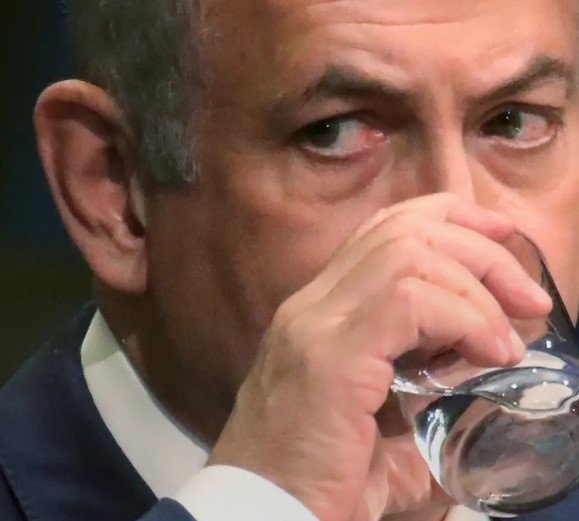Ex-Israeli PM Bennett echoes message, offering desalination know-how for a “free Iran” as Tehran struggles with its worst drought in a century.
Prime Minister Benjamin Netanyahu is taking Israel’s water technology pitch straight to the Iranian people — and tying it to a political challenge. In a rare direct appeal, he urged Iranians to stand up to their rulers, promising Israeli expertise in desalination and conservation “once the regime falls.”
A Video Glass of Water — and a Provocation
Netanyahu’s message, posted Tuesday, was crafted to look personal.
Speaking in English, holding a clear glass of water, he framed it as a greeting “from Jerusalem to the proud people of Iran.” The tone mixed empathy with confrontation. He accused Iran’s leaders of triggering the 12 Day War in June — a conflict Israel says was necessary to counter an “imminent and existential” nuclear and missile threat.
Then he pivoted to a softer target — water. Quoting Iranian President Masoud Pezeshkian’s own admission of shortages, Netanyahu seized on his line that “there won’t be any water in the dams by September or October.” He added bluntly: “He’s right. Everything is collapsing. In this brutal summer heat, you don’t even have clean, cold water to give your children.”
It was as much political theater as public policy pitch.
Iran’s Deepening Water Crisis
Iran’s drought is severe, and it’s not just a seasonal blip.
Government meteorologists say rainfall in the past four months has dropped 40% below the long-term average. The head of the country’s Environmental Protection Organization calls it the harshest dry spell in a century. Reservoir levels are plunging, prompting authorities in Tehran to reduce water pressure citywide.

This summer’s heatwave has made the shortage more acute, with rural communities reporting wells running dry. Officials have ordered government offices to slash water use and warned residents to expect tighter rationing.
One sentence from state media summed up the anxiety: “If current trends continue, by early autumn, major dams will be nothing more than cracked earth.”
Bennett Adds His Voice
Netanyahu wasn’t alone in addressing Iranians this week.
Former Prime Minister Naftali Bennett released his own video, also offering Israeli know-how for water and agriculture “to a free Iran.” His pitch echoed Netanyahu’s line — that Israel stands ready to share technology once the Islamic Republic’s political order changes.
While Bennett’s delivery was more understated, it still framed water as a bridge that could be built after a regime change. That linkage — technical aid in exchange for political upheaval — is not subtle.
And for Iranians already struggling to keep crops alive and taps running, it may resonate differently depending on whether they see it as genuine help or geopolitical opportunism.
The Tech Israel Wants to Sell
Israel’s water industry is something of a global case study.
Despite a desert climate, the country now produces more freshwater than it consumes, thanks to large-scale desalination plants along the Mediterranean and advanced wastewater recycling.
Some of the techniques Netanyahu hinted at include:
-
Reverse osmosis desalination plants supplying nearly 70% of Israel’s household water.
-
Drip irrigation systems that drastically cut agricultural water waste.
-
Reclaimed water reuse, with over 85% of wastewater treated and fed back into farming.
For Iran, which has both coastal access and a vast agricultural sector, the technology could be transformative — but only if politics allow.
How the 12 Day War Still Shadows the Message
Netanyahu’s address was not delivered in a vacuum.
The June conflict, short but intense, saw Israeli strikes on Iranian military infrastructure and missile sites. Israel framed it as preemptive; Tehran called it an unprovoked assault. Either way, it left thousands displaced and reinforced hostility between the two governments.
By linking his water offer to the removal of Iran’s current leadership, Netanyahu blurred the lines between humanitarian aid and political pressure. That makes the proposal more contentious — and perhaps less likely to be embraced in the short term.
Still, the fact that he spoke directly to the Iranian public rather than only about them marks a notable shift in tone.
What the Numbers Say
The scale of Iran’s water problem can be seen in stark data:
| Indicator | Current Level | Note |
|---|---|---|
| Rainfall drop (last 4 months) | -40% | Compared to long-term average |
| Years under drought | 5 | Consecutive years |
| Reservoir capacity usage | <30% | Many dams near critical level |
| Wastewater reuse | ~2% | Far below regional potential |
Experts inside and outside Iran warn that without urgent measures — from infrastructure upgrades to reduced agricultural water demand — the shortages could push entire provinces into chronic crisis.
One Iranian hydrologist put it simply: “We are running out of time, and we are running out of water.”








